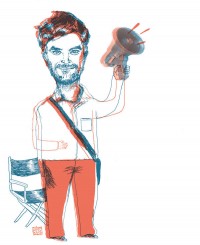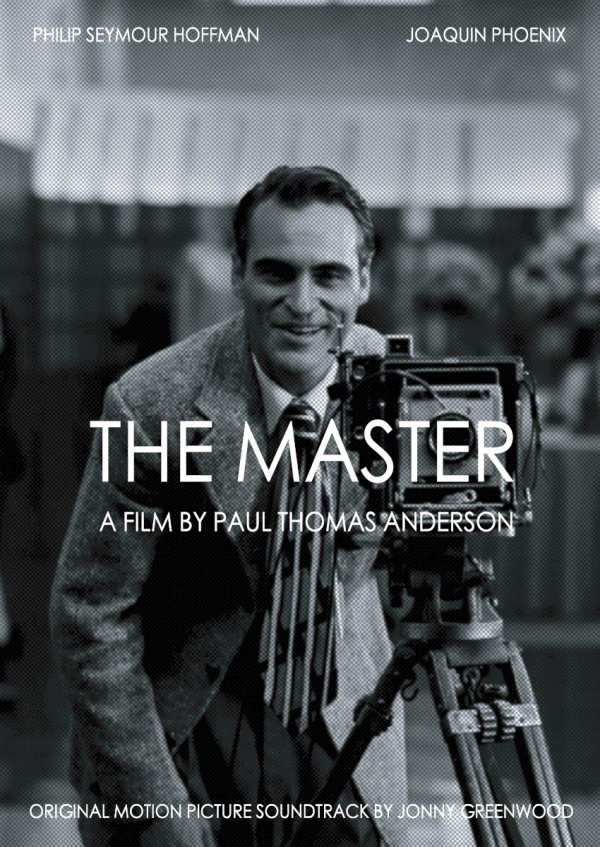FRESH AIR
DAVID EDELSTEIN: Paul Thomas Anderson‘s The Master is both feverish and glacial. The vibe is chilly, but the central character is an unholy mess — and his rage saturates every frame. He’s a World War II South Pacific vet named Freddie Quell, played by Joaquin Phoenix to the hilt — the hilt above the hilt. We meet him at war’s end on a tropical beach where he and other soldiers seek sexual relief atop the figure of a woman made out of sand.No, it’s not your father’s war — at least, the war portrayed in most sagas of the so-called Greatest Generation. Alcoholic, sex-addicted Freddie can’t adjust to a society that Anderson portrays as homogenized, repressed. Then he stumbles into something extraordinary — a burgeoning cult called “The Cause.” The Cause is allegedly modeled on Scientology in the days before its leader, L. Ron Hubbard, rebranded it as a religion. Why allegedly? Anderson won’t officially admit the connection, perhaps because the church is so given to suing its critics. Paul Thomas Anderson’s The Master is both feverish and glacial. The vibe is chilly, but the central character is an unholy mess — and his rage saturates every frame. He’s a World War II South Pacific  vet named Freddie Quell, played by Joaquin Phoenix to the hilt — the hilt above the hilt. We meet him at war’s end on a tropical beach where he and other soldiers seek sexual relief atop the figure of a woman made out of sand. No, it’s not your father’s war — at least, the war portrayed in most sagas of the so-called Greatest Generation. Alcoholic, sex-addicted Freddie can’t adjust to a society that Anderson portrays as homogenized, repressed. Then he stumbles into something extraordinary — a burgeoning cult called “The Cause.” The Cause is allegedly modeled on Scientology in the days before its leader, L. Ron Hubbard, rebranded it as a religion. Why allegedly? Anderson won’t officially admit the connection, perhaps because the church is so given to suing its critics. Whatever the model, the title character is named Lancaster Dodd and played by Philip Seymour Hoffman as a man with the soul of a child trying hard to present himself as a Brahmin-like patriarch and visionary. Freddie stows away on Dodd’s yacht after fleeing migrant workers who think he poisoned a man with his homemade booze — and he probably did, though it’s not clear. Rather than chucking Freddie overboard, The Master takes a fatherly interest. Paul Thomas Anderson’s films — Boogie Nights, Magnolia, even There Will Be Blood — have surrogate families that can be wonderfully attractive to emotional orphans like Freddie. Here, disciples eagerly submit to what’s called “processing.” Dodd asks questions and then repeats them over and over, at once bullying and hypnotic, until his subjects break and open up. Like a Freudian therapist, he targets past traumas — but these traumas supposedly go back to birth and before that, over the course of trillions of years. For Dodd, the body is but a vessel for a kind of Buddhist-like, transcendental soul. His processing purges basic emotions he calls “animal.” On one level, wayward Freddie longs to be led, but something in him resists committing to a man he doesn’t fully trust — and so the film becomes a push and pull of titanic wills. Freddie will either be subjugated or flee to a life of debauchery — and likely drink himself to death. There’s no middle ground here. There’s no middle ground for Phoenix, either. He’s both riveting and painful to watch. He also seems to be channeling other actors’ tics: Eastwood, Brando, even Robin Williams’ Popeye, the words dribbling out the side of his twisted mouth. But his scenes with Hoffman are amazing. Hoffman’s Dodd is perfectly nuanced, in the tradition of flimflam visionaries so in love with their own spiels they forget they’re frauds. MORE
vet named Freddie Quell, played by Joaquin Phoenix to the hilt — the hilt above the hilt. We meet him at war’s end on a tropical beach where he and other soldiers seek sexual relief atop the figure of a woman made out of sand. No, it’s not your father’s war — at least, the war portrayed in most sagas of the so-called Greatest Generation. Alcoholic, sex-addicted Freddie can’t adjust to a society that Anderson portrays as homogenized, repressed. Then he stumbles into something extraordinary — a burgeoning cult called “The Cause.” The Cause is allegedly modeled on Scientology in the days before its leader, L. Ron Hubbard, rebranded it as a religion. Why allegedly? Anderson won’t officially admit the connection, perhaps because the church is so given to suing its critics. Whatever the model, the title character is named Lancaster Dodd and played by Philip Seymour Hoffman as a man with the soul of a child trying hard to present himself as a Brahmin-like patriarch and visionary. Freddie stows away on Dodd’s yacht after fleeing migrant workers who think he poisoned a man with his homemade booze — and he probably did, though it’s not clear. Rather than chucking Freddie overboard, The Master takes a fatherly interest. Paul Thomas Anderson’s films — Boogie Nights, Magnolia, even There Will Be Blood — have surrogate families that can be wonderfully attractive to emotional orphans like Freddie. Here, disciples eagerly submit to what’s called “processing.” Dodd asks questions and then repeats them over and over, at once bullying and hypnotic, until his subjects break and open up. Like a Freudian therapist, he targets past traumas — but these traumas supposedly go back to birth and before that, over the course of trillions of years. For Dodd, the body is but a vessel for a kind of Buddhist-like, transcendental soul. His processing purges basic emotions he calls “animal.” On one level, wayward Freddie longs to be led, but something in him resists committing to a man he doesn’t fully trust — and so the film becomes a push and pull of titanic wills. Freddie will either be subjugated or flee to a life of debauchery — and likely drink himself to death. There’s no middle ground here. There’s no middle ground for Phoenix, either. He’s both riveting and painful to watch. He also seems to be channeling other actors’ tics: Eastwood, Brando, even Robin Williams’ Popeye, the words dribbling out the side of his twisted mouth. But his scenes with Hoffman are amazing. Hoffman’s Dodd is perfectly nuanced, in the tradition of flimflam visionaries so in love with their own spiels they forget they’re frauds. MORE

